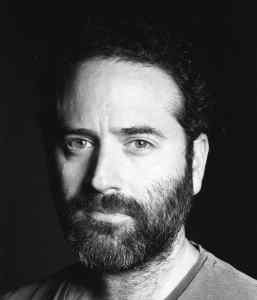
Your recent play, The Body of an American, has achieved enormous success. After premiering at Portland Center Stage, the play went on to win the Horton Foote Prize, the Edward M. Kennedy Prize, and the PEN Center USA Award for Drama. Can you tell us more about the journey of this play?
It’s been a twisty road, as is often (usually?) the case. I was researching and corresponding in a pretty formless way with Paul Watson (the Pulitzer Prize-winning war reporter who is the subject of The Body of an American) for almost two years before I received the McKnight National Residency & Commission from the Playwrights’ Center in Minneapolis, which provided some money and the opportunity for workshops. In-process drafts received grants from Sundance Theatre Lab as well as Theatre Communications Group, both of which allowed me to finally meet Paul Watson in person in Ulukhaktok, in the Canadian High Arctic, in February 2010, where he was covering the “Arctic and aboriginal beat” for the Toronto Star.
As a completed draft, the play entered the phase of readings and workshops at places like the New Harmony Project, Pioneer Theatre in Salt Lake City, and, most importantly, the JAW Festival at Portland Center Stage — important because Portland premiered the play the following season, in 2012, and we were incredibly lucky to find a first-rate director for that first production in Bill Rauch, artistic director of Oregon Shakespeare Festival. Despite the production’s strongly positive reception, and some of the above-mentioned awards, the keenest interest for a second production came from the UK. The Gate Theatre, in co-production with Royal & Derngate in Northampton, England, gave the play an outstanding second incarnation (with a script a good half-hour shorter). The Wilma Theater produced the play last winter; this winter it’s set to run off-Broadway at the Cherry Lane Theatre, following an opening in Hartford, in a co-production between Primary Stages and Hartford Stage, directed by Jo Bonney. Separate productions are planned for Theatre J in Washington DC, and Stage Left in Chicago, both in the spring of 2016.
Throughout this same period, I wrote two collections of poems about Watson, War Reporter (2013) and New Life (2015), both of which found publishers in the US and the UK. I also adapted The Body of an American into a one-act chamber opera with Stanford composer Jonathan Berger, entitled The War Reporter, part of a longer opera called Visitations that premiered at Stanford University, played at the Prototype Festival in New York City in 2014, and will come to Chicago’s Harris Theater in a new production in 2017.
I’m also writing a new play about Watson this year as part of a Guggenheim Fellowship, about his time in Syria and our concurrent, mostly tragicomic attempts to transmute those experiences into Hollywood gold.
Perhaps it’s best to say that I’ve come to accept over many years of writing that you cannot control who likes what you write if anyone does, and that it usually takes time, often a lot of time, to find those people, or for those people to find you and your work. With The Body of an American I’ve been lucky: Paul’s story seems to have moved a lot of people, as it did—and still does—move and inspire me.
What inspires you?
Writing inspires me, this gift of a life in which I can endeavor to live an examined life (it’s not often easy), to write about that which is challenging and changing me most. This has always been my goal. I don’t write well for others—that’s mostly why I don’t write TV or screenplays—and, perhaps as a consequence, a lot of what I’ve written remains unproduced and unpublished. But I lose my inspiration quickly if I’m thinking too much about a so-called audience or, heavens forbid, producers.
When I began, the writing was as much an escape from life as wrestling with it. This was certainly true in childhood. I wrote almost unconsciously and was often delighted and terrified by what seemed to arrive on the page. This self-therapy was basically the point. But about ten years ago I began to feel the immense solitude of this endeavor. Perhaps I was also disappointed with the “product” of writing literature, and literary drama and I began to value even more the opportunity that art can allow for connection with other artists—other people in general who happen to be searching creatively. So I’ve been inspired lately by collaborations, with musicians, composers, painters, and of course with all of the artists whose talents must come to bear in bringing a play to life.
What kind of theatre excites you?
I try to write the kind of play I think I want to see. I doubt I’ve ever achieved that. But I enjoy plays that make me feel confused, provoked, delighted, dealt with honestly, provided with many moments of earned beauty. I want a play to wake me up. I’m thinking mostly about the writing here, but these qualities apply to everything involved in a theatrical experience. My God, it’s complicated if not ineffable when it happens. And it’s all hopelessly subjective. I often seem to like theatre that many other people seem to dislike, and I dislike the theatre that many people seem to adore. So perhaps I have bad taste.
You are currently working on a commission with Center Theatre Group, in addition to a joint commission with the Oregon Shakespeare Festival and the Public Theater about the history of guns in America. Can you tell us more about these two commissions?
The commission for Center Theatre Group is also that Guggenheim Fellowship plays I mentioned: about Paul Watson, Syria, the rise of ISIS, the demise of journalism, and “selling war” in Hollywood. While Paul was covering Syria, he and I were developing a cable TV pitch about Western journalists covering Syria, and this play is derived from both Paul’s experiences as well as our fictional ideas. Oregon Shakespeare Festival’s American Revolutions Cycle and the Public Theater recently co-commissioned me to write a play about the history of guns in the US, and I’m still in the research phase of things. It couldn’t be a more timely yet timeless topic right now, obviously.
I’m also writing something new for Portland Center Stage about Sasquatch, UFOs, and cancer, with my old friend Kid Millions (aka John Colpitts) of the band Oneida, that’s shaping up to be a “percussion-based experimental chamber rock opera.” Or at least that’s what I’ve been calling it.
What advice do you have for playwrights starting out?
It’s kind of cheeky but I mean it: don’t take advice. Or don’t take much. Art is so much more subjective than we want to believe, and artists can have their hearts broken, or just confused, by everybody’s heartfelt opinion. Most dangerous are the opinions of people you like, love, admire. Try to stay close to that aspect of your art that’s least conscious, to write about that which is most meaningful to you, which is often what you find most frightens you. I don’t know if I believe this entirely, but may be read less, see less, while writing more. Or read and “see” that which truly instigates a meaningful creative response in you, and avoid all the rest.
What is something most people do not know about you?
I used to be funny. My two-year-old daughter thinks I still am. I met my wife, actor, and writer Jessica St. Clair, doing improv comedy in our much younger days. My plays are often perceived as heavy or serious, and they are, but you can’t tell a human story without humor. Life is tragic and profound and beautiful and boring, and it’s also absurd and hilarious and silly—I hope my plays convey some of that.
You also write poetry and have written a libretto for an Opera. How does your experience working with other forms of art influence your work as a playwright?
I’m most inspired by work outside the genres in which I’m writing. I’m not sure why. Perhaps it’s simply reaching one’s forties and feeling jaded about one’s own forms, looking outside for inspiration, but I’ve felt rejuvenated by my recent collaborations with composers like Jonathan Berger and artists like Tom De Freston, who is a Brit creating paintings in response to my new poetry collection, New Life. The plan is then to see how his paintings will influence the composition of my play about Syria and Hollywood.
I’m a fairly obsessive sort: my subjects tend to get worked out over various projects, in various genres, with the boundaries between these genres inevitably, purposefully blurred. I’ve been told I write poems like a playwright, and plays like a poet, and that’s mostly okay with me.
You have taught playwriting at Princeton University and a number of other places. How does your work as a teacher influence your work as an artist?
I have loved teaching—the ambition and optimism of new writers can be a kind of stimulant for a teacher. I’ve always tried to find a balance, however, between my own time to write and my time to teach. I’ve been selfish this way, and luckily I haven’t felt forced, economically speaking, into teaching any more than I’ve wanted to. For the past eight years, I’ve only taught for twelve days at the Sewanee Writers’ Conference in Sewanee, Tennessee. And Sewanee in and of itself has been an enormous influence for me, personally and artistically. Spending time with gifted poets and fiction writers (in addition to playwrights) has only enriched my sense of myself as a writer first and a genre-specific writer second.
It’s obvious, but the writing life can be quite lonely if not at times dispiriting, and, while usually, I enjoy the solitude, teaching can balance things out a bit. It’s nice to see other human beings once in a while, other than the Trader Joe’s clerk, the check-in folks at my gym, or my neighbors as they’re walking their dogs, too.
That said, I feel I’ve written better while teaching less. Against my better intentions, over a decade of teaching in the early aughts, I started to feel hemmed in creatively by my own ideas about what a play should or shouldn’t be. I now feel freer to write strangely, idiosyncratically, to take greater risks in style and subject. Leaving New York City in late 2007 coincided with my departure from full-time teaching, and I’ve enjoyed this remove from NYC theatre as well. I love returning for visits, don’t get me wrong, but the distance, the isolation, has been a good thing for me.
What does the future look like for you?
I’ll be busy trying to write the commissions I mentioned and traveling to take part, as much as I can, with the various productions of The Body of an American.
And I continue to write poems, as well as a prose memoir of my childhood that maybe in a year, or ten, will feel something close to finished.
